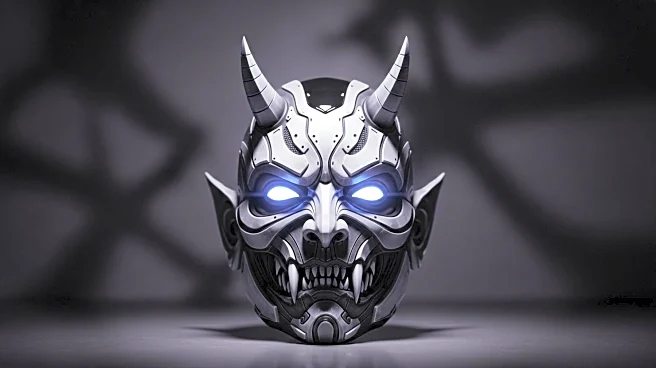What's Happening?
Netflix's animated film 'KPop Demon Hunters' has inspired a new line of Halloween merchandise, becoming a popular choice for costumes and themed fashion this season. The film, which follows a K-pop trio who double as demon hunters, has gained significant popularity, leading to collaborations with retailers like BoxLunch and Spirit Halloween. These collaborations offer fans a variety of themed apparel and accessories, including pajamas and band shirts, suitable for both Halloween cosplay and casual wear. The merchandise is part of a broader trend where pop culture franchises are influencing Halloween fashion, with items available online and in stores.
Why It's Important?
The collaboration between 'KPop Demon Hunters' and major retailers highlights the growing influence of pop culture on consumer behavior, particularly during the Halloween season. This trend not only boosts sales for retailers but also enhances brand visibility for Netflix's content. By tapping into the popularity of the film, retailers can attract a diverse customer base, including fans of K-pop and animated films. This strategy reflects a broader shift in marketing, where entertainment properties are leveraged to create themed merchandise that resonates with consumers, potentially leading to increased engagement and revenue for both the entertainment and retail industries.
What's Next?
As Halloween approaches, retailers are likely to continue expanding their pop culture-themed offerings to capitalize on consumer interest. The success of 'KPop Demon Hunters' merchandise could encourage similar collaborations with other popular franchises, further integrating entertainment and retail. Additionally, the popularity of such merchandise may influence future content creation, with studios potentially developing films and series with merchandising opportunities in mind. Retailers may also explore new marketing strategies, such as exclusive releases or limited-edition items, to maintain consumer interest and drive sales.
Beyond the Headlines
The integration of pop culture into seasonal merchandise raises questions about consumer culture and the commercialization of holidays like Halloween. While these collaborations offer fans a way to express their interests, they also reflect a broader trend of commodifying cultural phenomena. This dynamic can influence consumer expectations and spending habits, as well as the types of content that studios prioritize. As entertainment properties continue to shape consumer trends, the line between content and commerce may become increasingly blurred, prompting discussions about the impact of such practices on cultural and economic landscapes.









